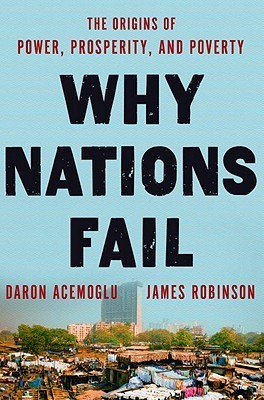
Why Nations Fail: The Origins of Power, Prosperity, and Poverty
Daron Acemoğlu, James A. Robinson
About the Author

Daron Acemoğlu
Questions & Answers
Institutions significantly shape the economic and political development of nations. They determine the rules and incentives that guide behavior, influencing everything from education and investment to governance and conflict. Extractive institutions concentrate power in the hands of a few, often enriching the elite at the expense of the majority. This can lead to economic stagnation and political instability.
In contrast, inclusive institutions distribute power more broadly, fostering economic growth and political stability. They encourage investment, innovation, and the protection of property rights, which are crucial for prosperity. The relationship between extractive and inclusive institutions is synergistic: extractive political institutions often lead to extractive economic institutions, and vice versa. This creates a feedback loop where both types of institutions reinforce each other, either promoting or hindering development.
Understanding the nature of these institutions is key to explaining the varying economic and political outcomes across nations.
Historical factors contributing to the development of inclusive or extractive institutions are rooted in political and economic dynamics. Inclusive institutions emerge when there's a balance of power, political pluralism, and a rule of law. Key factors include:
- Critical Junctures: Events like the Black Death or colonialism can disrupt existing power structures, potentially leading to inclusive institutions if they're met with a conducive environment.
- Institutional Drift: Over time, small differences in institutions can accumulate, shaping a society's trajectory.
- Elites' Fear of Power Loss: Elites often resist inclusive institutions due to the fear of losing power, leading to extractive institutions.
- Resource Distribution: Access to resources can influence the type of institutions developed; inclusive institutions are more likely in resource-rich societies.
These factors interact with political and economic dynamics as follows:
- Political Power: Inclusive political institutions support inclusive economic institutions, while extractive political institutions tend to maintain extractive economic institutions.
- Economic Growth: Inclusive institutions foster economic growth through property rights, innovation, and competition, while extractive institutions can stifle growth.
- Conflict: Conflicts over resources and power can either reinforce or challenge existing institutions, leading to either inclusive or extractive outcomes.
The concepts of "critical junctures" and "drifting apart" significantly influence the evolution of institutions and economic development. Critical junctures are pivotal events or periods that disrupt existing power balances, potentially leading to institutional change. These events, like the Black Death or the Industrial Revolution, can either promote inclusive institutions (like in England) or reinforce extractive ones (like in the Ottoman Empire). Drifting apart refers to the gradual divergence of institutions over time due to small differences and historical events. This process can amplify initial institutional differences, leading to divergent economic outcomes. For instance, the initial institutional differences between England and the rest of Western Europe, combined with critical junctures like the Black Death and Atlantic trade, led to England's inclusive institutions and subsequent economic growth, while other regions remained extractive and lagged behind. These concepts underscore that history is not deterministic but shaped by the interplay of institutions and historical events.
The barriers to developing inclusive institutions, which are crucial for economic development and poverty reduction, include:
-
Extractive Political Institutions: These concentrate power in the hands of a few, leading to policies that benefit the elite at the expense of the majority. Overcoming this requires political reforms that promote pluralism and distribute power more evenly.
-
Fear of Creative Destruction: Innovations and economic growth can threaten the interests of the elite, leading to resistance. This can be addressed by creating a political environment that protects property rights and encourages innovation.
-
Lack of Political Centralization: Without a strong, centralized state, enforcing laws and property rights is difficult. Overcoming this requires building a capable state that can provide security and enforce the rule of law.
-
Elite Resistance: Elites with vested interests in the status quo often resist change. This can be tackled by empowering broader segments of society and ensuring that the benefits of economic growth are shared more equitably.
-
Historical Path Dependence: Past institutional choices can create a legacy that perpetuates extractive institutions. To overcome this, it's essential to understand historical dynamics and identify critical junctures for institutional change.
To promote economic development and reduce poverty, these barriers must be addressed through:
- Education and Empowerment: Educating citizens about their rights and empowering them to participate in decision-making processes.
- International Cooperation: Encouraging international support for institutional reforms and development assistance that focuses on building inclusive institutions.
- Inclusive Governance: Ensuring that governance structures represent a broad range of interests and that policies are designed to benefit the entire population.
The book emphasizes that prosperity and poverty are shaped by institutions, particularly economic and political ones. Understanding this can inform efforts to combat poverty and promote sustainable development by focusing on:
- Inclusive Institutions: Prioritize building institutions that distribute power and wealth more evenly, fostering economic growth and reducing inequality.
- Political Reforms: Encourage political systems that are open and accountable, allowing for peaceful change and preventing the concentration of power.
- Education and Property Rights: Strengthen education systems and secure property rights to empower individuals and encourage investment.
- Media and Information: Support free media to inform citizens and facilitate collective action against extractive institutions.
- Conditional Aid: Use foreign aid to promote inclusive institutions, rather than just providing resources without addressing underlying issues.
- Empowerment: Empower civil society and marginalized groups to participate in decision-making processes and drive change.
By addressing these aspects, societies can move from extractive to inclusive institutions, leading to sustainable development and reduced poverty.